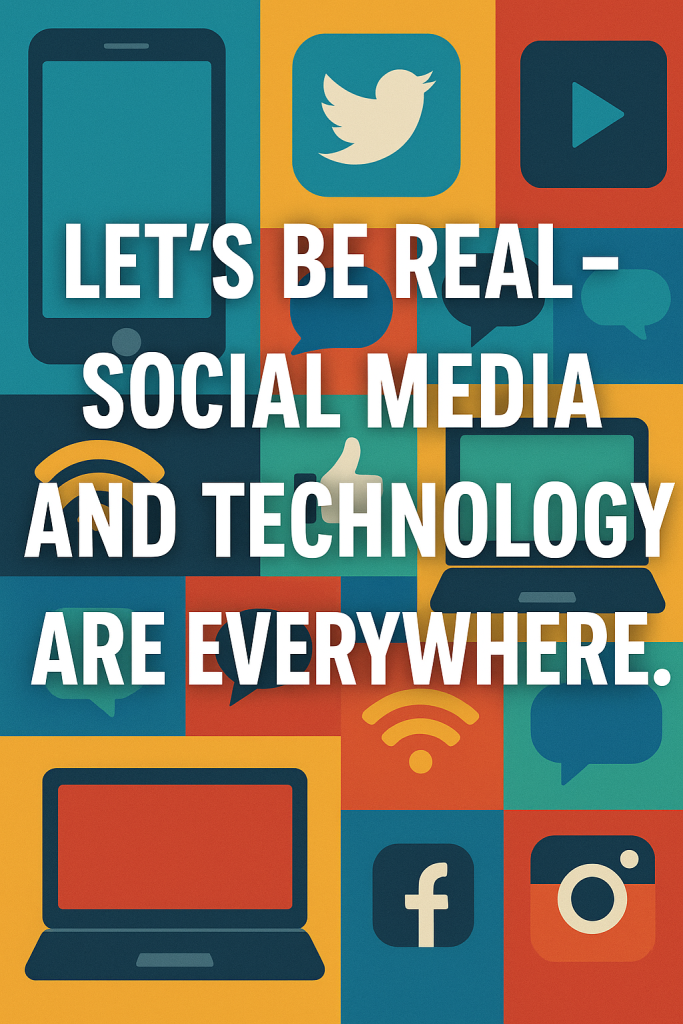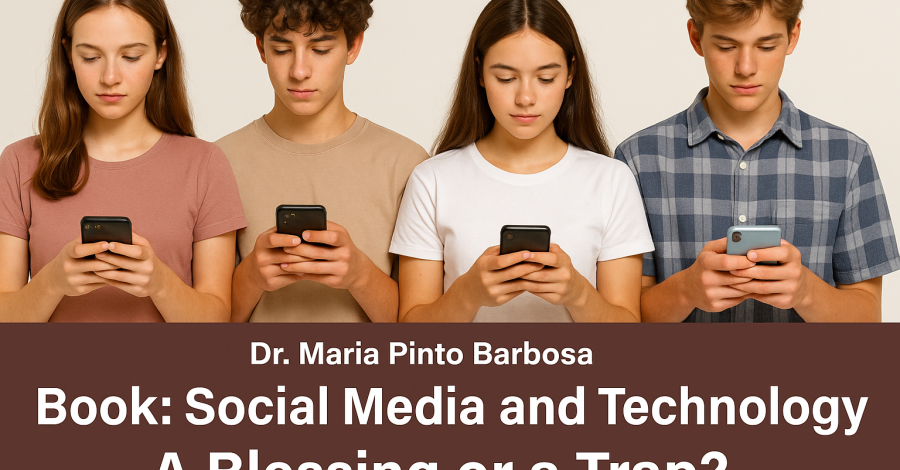Let’s be real – social media and technology are everywhere.
By Dr. Maria Pinto Barbosa
In today’s fast-paced digital age, technology and social media surround us in every aspect of life. From the moment we wake up, our phones buzz, screens light up, and notifications call for attention. Yet beneath the convenience and connection, there’s a profound question to be asked: Is technology a blessing-or a trap?
The Double-Edged Power of Technology
Technology has transformed the way we communicate, learn, and live. It enables us to connect across continents, access information instantly, and explore creative frontiers unimaginable a few decades ago. Social media allows us to share stories, advocate for causes, and express faith in powerful new ways.
But with every blessing comes a burden. The same devices that connect us can consume us, robbing peace, focus, and authenticity. What was meant to serve humanity often begins to enslave it, replacing purpose with distraction and joy with digital dependency.
The Psychology of Digital Dependency
Social platforms are meticulously designed to hijack human attention. Each notification, like, or comment triggers dopamine-our brain’s pleasure chemical-training us to crave constant stimulation. This neurological cycle creates digital addiction, blurring the line between genuine connection and programmed compulsion.
Young minds are especially vulnerable. Teenagers and children are developing emotionally and cognitively, yet their daily exposure to screens reshapes how they see themselves and others. The comparison culture fuels insecurity, anxiety, and loneliness. Over time, their sense of identity can become tied to online validation instead of inner worth or divine truth.
Technology’s trap isn’t loud-it’s quiet, gradual, and disguised as entertainment or “staying connected.”
Faith as a Compass in a Digital World
Dr. Maria Pinto Barbosa reminds us:
“You were created for more than likes, trends, or viral moments. You were created for meaning. For light. For love.”
Faith provides an unshakable compass in the noisy, ever-changing digital landscape. It helps us separate illusion from truth, distraction from purpose. When we let faith-not culture-be our filter, we begin to reclaim the balance technology often steals.
- Let faith be your filter, not the world’s approval.
- Guard your mind and heart from the content that drains your peace.
- Use technology intentionally, to build community, share hope, and glorify God.
When technology serves faith, it becomes a tool for transformation, not temptation.
Part I: Awakening Awareness – Understanding Technology’s Influence
Before change comes awareness. Technology isn’t neutral-it’s designed to shape thought patterns, habits, and even emotions. The constant flood of videos, messages, and images shortens attention spans, rewires empathy, and fosters discontent.
Social media often presents filtered versions of reality that can distort self-worth. By recognizing how these digital mechanisms affect the brain and heart, we can make mindful, faith-led choices instead of reactive ones.
Ask yourself:
- Am I using this platform, or is it using me?
- Does this content strengthen my faith or weaken it?
- Does my time online align with my values-or steal time from them?
Awareness leads to accountability, and accountability leads to freedom.
Part II: Exposing the Dangers – Emotional
The dangers of digital overuse are both emotional and spiritual. While technology can inform and entertain, it can also numb the spirit, dull creativity, and distance us from real human connection.
1. The Illusion of Connection
We may have hundreds of online “friends” but feel increasingly alone. True connection requires presence, listening, and empathy-things that can’t be downloaded or streamed.
2. The Trap of Comparison
Social media thrives on comparison. We scroll through highlight reels and forget that behind every picture-perfect moment lies a human story of struggle and imperfection. Comparison breeds envy, eroding gratitude and self-worth.
3. The Loss of Purpose
When likes and followers define success, purpose becomes performance. Technology tempts us to measure our worth through metrics instead of meaning.
4. Spiritual Disconnection
Constant digital noise silences reflection and prayer. When we lose moments of stillness, we lose intimacy with God-the source of true peace and direction.
Part III: Restoring Balance – Reclaiming Peace and Control
Balance doesn’t mean rejecting technology; it means redeeming it. We can coexist with the digital world without surrendering to it.
Steps to Build Digital Balance
- Designate Tech-Free Times – Disconnect during meals, prayer, and family moments.
- Limit Screen Time – Use built-in tools to track daily usage and set intentional limits.
- Curate Your Feed – Follow voices that inspire faith, wisdom, and positivity.
- Take Sabbath Breaks – One day a week without screens can renew clarity and connection.
- Prioritize Real Relationships – Replace scrolling with conversation, laughter, and shared experiences.
Digital balance restores mental health, strengthens focus, and revives the heart’s connection to God’s voice.
Part IV: Living with Faith, Purpose, and Wisdom
To thrive in a digital age, we must remember who we are and why we were created.
“Let technology be your servant, not your master. Let faith be your filter, not the world’s approval. And let your life-both online and off-reflect the love and wisdom of the One who created you.”
Core Principles for Faithful Digital Living
- Your mind is precious – protect it. Don’t allow harmful content to pollute your thoughts.
- Your heart is sacred – guard it. Avoid spaces that promote envy, anger, or pride.
- Your time is valuable – use it well. Invest your minutes in activities that honor growth and connection.
- Your faith is powerful – let it guide you. Every click, post, or message can be an act of light when driven by faith.
Technology should elevate your life, not enslave it. It should amplify good, not anxiety. With wisdom, we can transform our screens into platforms of purpose, truth, and love.
Guidance for Parents: Helping Teens Detox from Screens and Gaming
Parents play a vital role in shaping how young people interact with technology. A digital detox isn’t about punishment-it’s about protection and restoration. Helping teens break free from screen overuse requires both compassion and structure.
1. Start with Open Conversations
Talk honestly about technology’s benefits and dangers. Listen without judgment, and invite your teen to share their feelings about social media and gaming.
2. Model Healthy Behavior
Teens learn more from observation than instruction. Practice what you teach—limit your own screen time, prioritize family moments, and engage in tech-free activities together.
3. Create Clear Boundaries
Set screen-free hours before bedtime and during meals. Remove devices from bedrooms to improve sleep and focus. Establish consistent expectations without harshness.
4. Replace Screens with Purposeful Activities
Encourage sports, reading, art, volunteering, or faith-based youth programs. Substituting screen time with meaningful pursuits fills the emotional void that gaming or scrolling often tries to satisfy.
5. Schedule Family Digital Detox Days
Choose one day per week where everyone disconnects. Use this time to reconnect through outdoor activities, family prayers, or simply laughter.
6. Offer Emotional Support During Withdrawal
Digital dependency triggers emotional reactions-boredom, frustration, or irritability. Be patient, empathetic, and firm. Celebrate small victories when your teen chooses real-life engagement over virtual escape.
7. Reconnect Them to Faith and Identity
Remind your teen that their value is not based on likes or achievements but on who they are in God’s eyes. Guide them to seek fulfillment in purpose, creativity, and faith-driven living-not in screens.
A digital detox done with love can help teens rediscover the beauty of silence, creativity, and real connection. With your guidance, they can learn to let technology serve them-not enslave them.
Conclusion: Created for More Than the Screen
Technology is neither enemy nor savior-it’s a mirror reflecting how we choose to use it. In the hands of faith, it becomes a bridge; in the absence of wisdom, a barrier.
We were created for meaning, not metrics; for love, not likes; for purpose, not popularity. As we move forward into this digital world, may we guard our hearts, protect our minds, and use every platform as a light of truth in a world desperate for hope.

Let’s be real – social media and technology are everywhere. They shape how we think, talk, and even how we see ourselves. You might wake up and the first thing you do is check your phone. Maybe you scroll through Instagram or TikTok to see what’s trending. It’s fun, right? But then, after a while, you start to feel a little different – maybe more tired, more distracted, or even a bit down. You might not realize it, but your brain is reacting to all that screen time.
Dr. Maria Pinto Barbosa integrates these sources through a holistic Christian perspective, emphasizing emotional wellness, faith, and responsible digital living.
Her approach combines psychological – theological truth, educational guidance, and mental health awareness to help readers – especially youth and parents – understand how to use technology with wisdom, discipline, and purpose in a connected world.
Dr. Barbosa provides services to client in Portuguese, English and Spanish. for an appointment -https://drmariabarbosa.com/palm-coast-holistic-therapy
Discover more from Dr Maria Barbosa
Subscribe to get the latest posts sent to your email.





